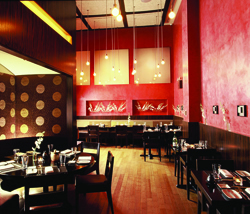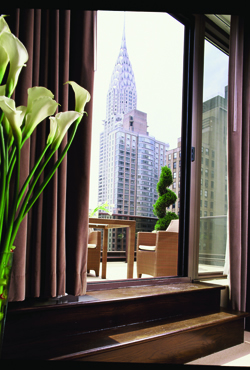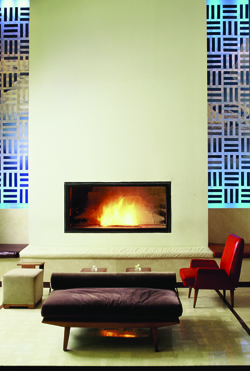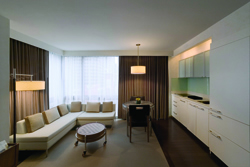- Home
- Media Kit
- Current Issue
- Past Issues
- Ad Specs-Submission
- Ad Print Settings
- Reprints (PDF)
- Photo Specifications (PDF)
- Contact Us

![]()
ONLINE

Preserving the Integrity of the Property
Editors’ Note
Mary Lou Pollack is a 28-year veteran of the hospitality industry and assumed her current post in May 2003. Prior to this, she worked for New Jersey-based Prime Hospitality Corp. for 16 years, eventually becoming Vice President of National Sales. Pollack was the recipient of the Frank W. Berkman Tourism Achievement Award for General Manager of the Year in New York City in 2007, the same year The Alex received the Leaders Club Award of Excellence from The Leading Hotels of the World, Ltd. She is a graduate of Duke University.
Property Brief
Owned by real estate developer Izak Senbahar and hotel developer Simon Elias, The Alex Hotel (www.thealexhotel.com) opened in November 2003 in midtown Manhattan and features 203 luxurious rooms and suites, each with custom-designed furniture, original artwork, a fully equipped kitchen (in suites), and a host of high-tech amenities, including a DVD player, high speed Internet access, and a flat-screen television in every bedroom, living room, and bathroom. The property also houses business and fitness centers, as well as Riingo, a Japanese-American restaurant serving the food of renowned chef Marcus Samuelsson.
The economic crisis has affected all business, but the hotel industry has been particularly affected in New York. How much of an impact did you see for New York City and specifically for The Alex?

The Wine Room for
private dining at Riingo
The hotel very much mirrored what happened in the city as a whole. In general, when the year is over, you’ll see that occupancy was actually the same or up a bit compared to 2008, but the losses were in average rate and at some points this year, our average rate has been as much as 30 percent under what it was last year. That is also exactly what happened to the city as a whole, and to the four- and five-diamond sectors. Hotels either took catastrophic decreases in occupancy or they got their occupancy but had enormous decreases in rate.
During times when many are cutting back on staff and service, how challenging is it to keep your service standards?

The view from the Penthouse Suite
We preserved the things that distinguish this property. We maintained the Leading (Hotels of the World) standards and kept the 24-hour room service. We preserved everything we thought the guest would care about. We did cut back on staffing in certain areas and we saved money in areas where the guest wasn’t necessarily aware. I used to spend $8,000 a month on lobby and guest room flowers. Now I have my staff buying the same flowers and putting them in vases and we spend $1,000 a month. I also went from pens with logos to pencils with logos in the guest rooms, and the savings were enormous. We also ask each guest at check in, which is the standard, if he would like a paper, but we stopped giving the New York Times to the entire hotel every night, and that is probably saving about $96,000 a year. Even if it’s two or three years until things come back, we have to try to preserve the integrity of the property or all is lost.
Many say it’s very tough to be successful in a hotel restaurant. Have you been happy with how the restaurant and bar area for Riingo have grown, and is that a place where you can really be profitable?

The fireplace in the lobby
The goal of making a hotel restaurant profitable is difficult to achieve. Our restaurant is busy, the food is good, guests are happy, and the hotel is profitable.
During times when you’re asking your people to do more, how important is it from a leadership role to communicate regularly with them so they understand where the hotel is going?
Most of our associates are thrilled that they didn’t have to take a cut in pay. At our weekly staff meetings, I am honest and update people on how we are doing. It’s very important for people to see the general manager making the effort to increase revenue and preserve jobs. So from a morale standpoint, we fared very well.
There are those who say that one either likes to open hotels or to manage them, but you seem to enjoy both aspects. Is that the case, and from when you started with the property, could you have imagined five years later that you would still be here?

Suite living and dining room
The effort involved in opening this hotel was enormous. I thought after five years that things would be easier. Who could have foreseen that there would be a global recession, and that we would have to go back and rebuild our business all over again. But I have enjoyed every minute of this journey at The Alex and love each new day.
You have a strong owner relationship and there seems to be a common vision for the property. How important is it also during these times to have open communication and dialogue with the owners?

Suite with full kitchen
Our owners, Simon Elias, Izak Senbahar, Jeff Stoler, and Niso Bahar have been very consistent for the past six years. They have always been supportive. When we went through opening and growing pains, they were very much in the boat with me. They were equally helpful this year. I know I am fortunate – it’s hard to improve upon that human element.